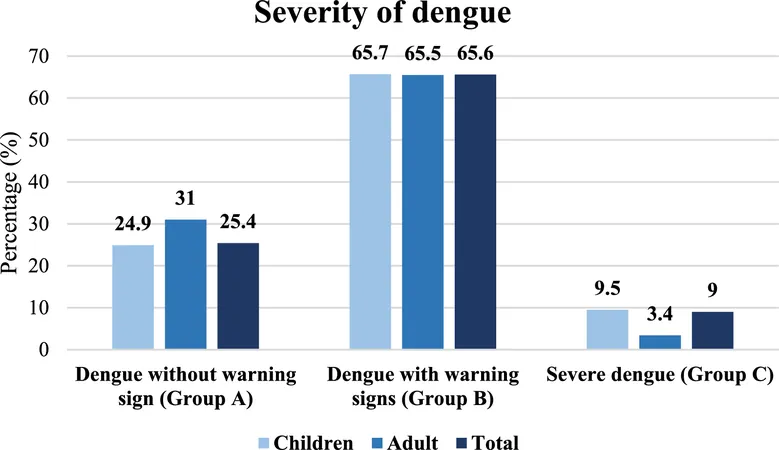
The Shocking Truth About "Junk DNA": What Nobel Laureate Thomas Cech Is Revealing Now!
2025-03-28
Author: Wei Ling
In a groundbreaking revelation that could shake the foundations of genetic science, Nobel Prize-winning biochemist Thomas Cech is joining the ranks of scientists who vehemently reject the antiquated "junk DNA" narrative, focusing instead on the often-overlooked world of RNA. Cech, who shared the Nobel Prize in 1989 for his pioneering discoveries related to RNA's catalytic functions, emphasizes the critical importance of RNA in understanding genetics and its potential far beyond what many have previously considered.
Diving Deep into RNA Research
In his latest book, *The Catalyst: RNA and the Quest to Unlock Life's Deepest Secrets*, Cech shares his extensive adventures in RNA research. He challenges the misconception that a staggering 75% of the human genome is irrelevant—or "junk." Contrary to popular belief, Cech points out that this so-called genomic "dark matter" is largely transcribed into RNA and may hold the keys to new biological functions.
Cech explains, "The coding regions of human genes that instruct protein production only account for about 2% of our entire genome. When we include introns—those sequences that interrupt coding regions—the total rises to 26%. This leaves around 74% of our genome shrouded in mystery, previously dismissed as junk."
He warns, however, that advancements in RNA sequencing technologies are illuminating this dark matter, revealing that much of it is transcribed into long noncoding RNAs (lncRNAs), which are abundant not just in humans but also in other mammals, including laboratory mice.
Unraveling the Mysteries of lncRNAs
Though many lncRNAs appear to lack defined functions, some show promising potential. For instance, a lncRNA named Firre is crucial for normal blood cell development in mice, while another, Tug1, is vital for male fertility. These findings highlight the possibility that many lncRNAs play essential roles often overlooked by traditional genetic research frameworks.
Notably, some scientists remain skeptical of this burgeoning field, labeling many of these transcripts as "transcriptional noise." They argue that RNA polymerase, the enzyme that synthesizes RNA, can sometimes mistakenly transcribe regions of the genome that serve no function. However, it’s essential to recognize that past misconceptions regarding RNA—like those about telomerase RNA and microRNAs—were once deemed "noise" but are now acknowledged for their significant roles in cellular function.
The Stalling of Scientific Progress
Cech's primary concern extends beyond merely debunking the junk RNA hypothesis; he warns that adhering to outdated paradigms stifles potential discoveries in genetics. Scientists who do not embrace the complexity of RNA may unknowingly hinder their own research, remaining blind to the rich diversity and potential utility of these molecules.
This raises a critical question: Could the traditional Darwinian framework, which once predicted that non-coding regions of DNA were largely functionless, be obstructing scientific progress? As Cech argues, expectations informed by an outdated paradigm may lead to significant blind spots for new discoveries.
A Call for a New Paradigm
With the growing body of evidence suggesting that the junk DNA narrative is increasingly untenable, it’s clear that the scientific community must reassess its approach to RNA and genetic research. Cech implicitly calls for a new paradigm—one that focuses on the functional roles of noncoding RNAs.
While many researchers still cling to outdated assumptions, the next generation of scientists may find themselves at the forefront of discovering the crucial functions hidden within our genetic "dark matter." As the junk DNA narrative crumbles, the field of genetics is on the verge of a revolutionary transformation that could redefine our understanding of life itself.
Stay tuned for more exciting developments in this unfolding story as we dive deeper into the mysteries of RNA!



 Brasil (PT)
Brasil (PT)
 Canada (EN)
Canada (EN)
 Chile (ES)
Chile (ES)
 Česko (CS)
Česko (CS)
 대한민국 (KO)
대한민국 (KO)
 España (ES)
España (ES)
 France (FR)
France (FR)
 Hong Kong (EN)
Hong Kong (EN)
 Italia (IT)
Italia (IT)
 日本 (JA)
日本 (JA)
 Magyarország (HU)
Magyarország (HU)
 Norge (NO)
Norge (NO)
 Polska (PL)
Polska (PL)
 Schweiz (DE)
Schweiz (DE)
 Singapore (EN)
Singapore (EN)
 Sverige (SV)
Sverige (SV)
 Suomi (FI)
Suomi (FI)
 Türkiye (TR)
Türkiye (TR)
 الإمارات العربية المتحدة (AR)
الإمارات العربية المتحدة (AR)